The term Fucked-up, Insecure, Neurotic, and Emotional was popularised by the rock band Aerosmith, it was the second track on the band’s 1989 album Pump. It is also used in rehabilitation programs such as Alcoholics Anonymous and Narcotics Anonymous as a phrase to describe the feeling of life being out of control and constant chaos. In the movie, “The Italian Job,” FINE is described as “freaked out, insecure, neurotic, and emotional.”
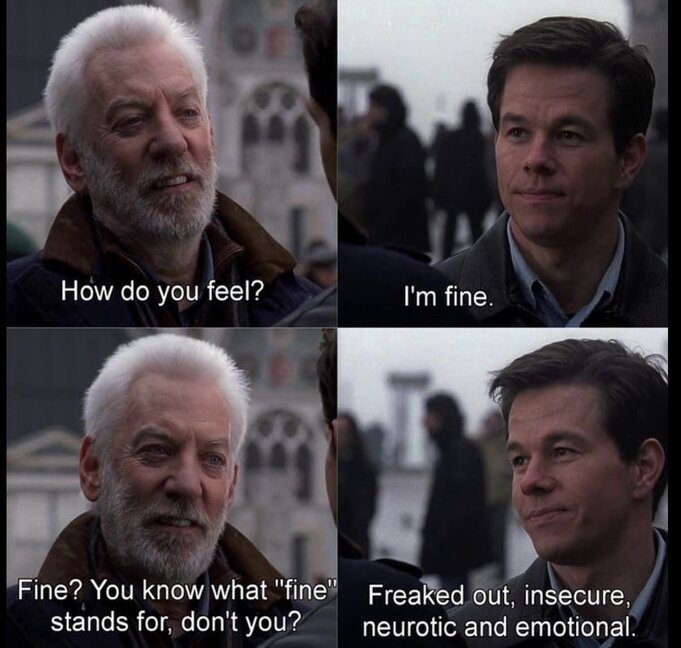
Other references to the FINE acronym in popular culture include A scene from the British crime drama television series Happy Valley (series 1 episode 4), also referenced in the American slasher film Scream 2 and the 2018 American superhero movie Deadpool 2; the following scene unfolds:
Buck: You know what “fine” stands for, Wade? Fucked up, insecure, needy, and emotional. According to the…(pauses)
Wade Wilson: Kübler-Ross.
Buck: Yeah. According to the Kübler-Ross model, denial is just one of the five stages of grief.
Wade Wilson: Jesus Christ, Buck! No more speaking lines for you.
Fucked up, insecure, needy, and emotional
In her memoir, Thicker than Water: A Memoir 1 American Actress and star of ABC’s American political thriller television series Scandals, Kerry Washington, chronicles her upbringing and life’s journey thus far. She revealed how she had dealt with and hid childhood trauma through magical thinking, people-pleasing and denial. Through the book, Washington attempts to answer the questions such as: Who am I? What is my truest and most authentic self? How do I find a deeper sense of connection and belonging? She attempts to make sense of herself, her upbringing and her family dynamics.
One of my favourite terms Kerry used to make sense of her childhood trauma and navigate her family dynamic is a definition of FINE that she refers to as Fucked-up, Insecure, Neurotic, and Emotional. Most of us can relate to this definition of being FINE as we are mostly in denial of our childhood trauma and the role our parents and caregivers played in our messy upbringing. Kerry writes:

Like a lot of families, the magic trick was in the pretending. We pretended to ourselves, to each other, and to the outside world that our family was not suffering the pain of life’s disappointments. We were fine—but I learned a long time ago that FINE can be an acronym for fucked-up, insecure, neurotic, and emotional.
I learned a long time ago that FINE can be an acronym for fucked-up, insecure, neurotic, and emotional.
Magical Thinking, People Pleasing and Denial
Kerry’s parents were always fighting, and as a coping mechanism, she learned to people-please. She was supposed to deliver them happiness and was probably the one holding her parents marriage together. She writes:
There was yelling and crying, but only when they thought I was asleep. The next morning, they’d smile and pretend all was fine.… So, I, too, learned to smile, to cover for them, to pretend—to resist the call to see what was really going on. I learned to be someone else early on, my people-pleasing skills honed on those mornings when nothing was deemed amiss. I learned to keep my parents happy so that I would be safe. But something was still off. And I blamed myself.
From what I remember, most of the fights were about money, and about the fact that neither of my parents felt like they were in the marriage they wanted to be in, or more precisely, that neither was married to the person they wanted to be married to. They argued about my dad’s spending versus my mother’s thriftiness; my dad’s failures to earn versus my mother’s failure of ambition; my dad’s regular absences versus my mother’s obsession with me.
They both harbored deep disappointment over what their lives had become—my mother was disappointed in my dad, and my dad was disappointed in the marriage. I developed a sense that I was the only thing keeping them together, or that I had to try to be. I was supposed to deliver them to happiness, to avoid triggering in them any emotion even close to disappointment. So, when they fought, I took it as my failure, and felt like it was my job to fix it.
So, I, too, learned to smile, to cover for them, to pretend—to resist the call to see what was really going on.
Kerry also describes how she learned to pretend and act a role from a very tender age. Both she and her parent lived in an illusion filled with magical thinking. The fairytale Kerry describes is a place most of us can identify from our childhood upbringing. She reminisces:
Each of us has spent a lifetime playing a role vital to our shared narrative.
When people ask me if I am the first actor in my family, I often joke that I am just the first to get paid for it. There are no other professional performing artists in our family tree that I know of, but we—my mom, my dad, and me—are a family of performers. Each of us has spent a lifetime playing a role vital to our shared narrative. My role in our performance came naturally because I was born into its twists and turns and draped in its masks and costumes. We three were the picture-perfect presentation of ourselves as we wanted to be perceived not only by the outside world, but by each other. We were a fairy-tale portrait of success. And this was the only show I knew—we performed it all day long, and for years. This script was how we tried to avoid pain, messiness, and discomfort.
The thing about an illusion is that, unless you are the magician, you don’t always see the trick when you are inside of it. My dad and mom were the magician and his assistant, and I was the audience member who had been invited onto the stage to be cut in half. I had no window into the secrets of how the trick had been performed, but I smiled and waved and received the applause in any case, knowing that without me, their act was incomplete. So, we dressed our part and performed our fairy tale, but like a princess hidden away in Jamie Towers, I knew that there was more to the story that I had yet to discover, more to my life that had yet to unfold.
The thing about an illusion is that, unless you are the magician, you don’t always see the trick when you are inside of it.
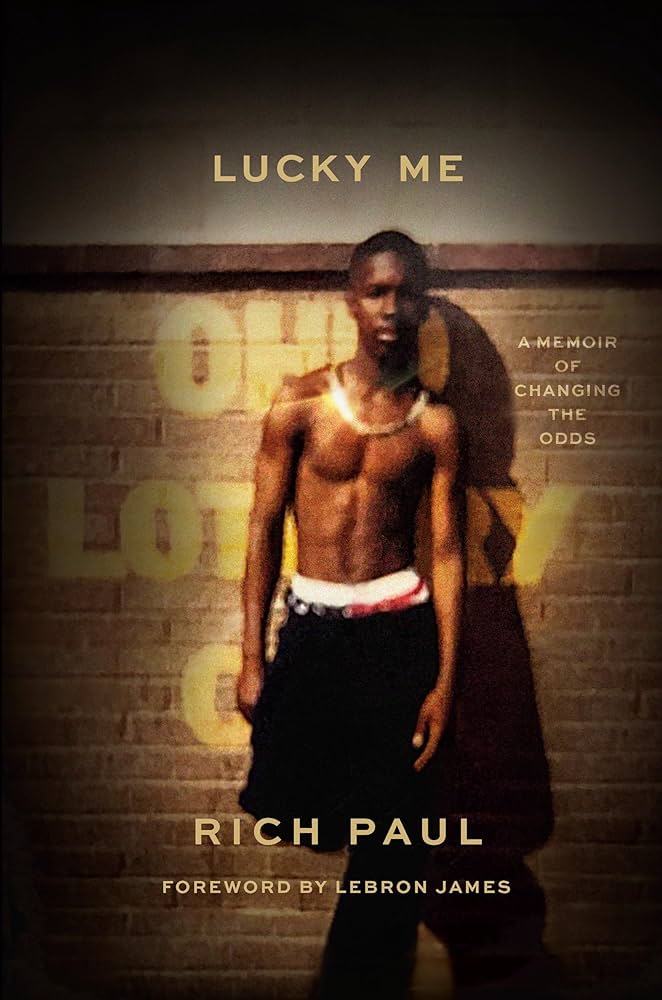
In his memoir, Lucky Me: A Memoir of Changing the Odds 2, American sports agent and founder of Klutch Sports Group, Rich Paul, writes about how growing up in the streets selling weed, drugs and gambling fucked up his mind. He reminisces about how his mother’s addiction to pills also messed his mind up growing up.
Like a million other Black kids of my generation, I grew up in what outsiders called a ghetto but we experienced as a war. Those of us who survived that war came out traumatized, but also with a special understanding of the world. Our G.I. Bill was for a college without walls whose curriculum was the lessons we learned on the block, from the mothers we lost and the fathers we found, and from each other. One of the most important things I learned was a set of rules. These rules weren’t written down in any books, but they were as real and unforgiving as the concrete under my feet. If you broke these rules, you paid a real-life price, and I’m not talking about fines or free throws. You paid for these violations with your reputation, your freedom, maybe even your life.
If you broke these rules, you paid a real-life price, and I’m not talking about fines or free throws. You paid for these violations with your reputation, your freedom, maybe even your life.
A lot has been said about how crack devastated the Black community, but I’m here to testify that unless you lived through it, you really don’t know. Crack had a destructive power that was unique in the history of narcotics. It was worse than the pills my mom popped, because the high was more intense but shorter in duration. It was worse than heroin, because it hyped you up instead of nodding you off. And crack smokers needed their hit so frequently, the sheer amount of product that was moving flooded the streets with cash, more than the hood had ever seen before. All that money flowing through the neighborhood increased the levels of violence in the city. So in addition to our people getting hooked on this horrific substance during the 1980s, young Black males started killing each other at an unprecedented rate.
“Crack was so powerful it decimated my mother’s love and expedited my adolescence. I had to grow from a cub to a young wolf right away. My mom’s addiction and all the associated problems became normal to me. I had no idea my life was profoundly fucked up.”
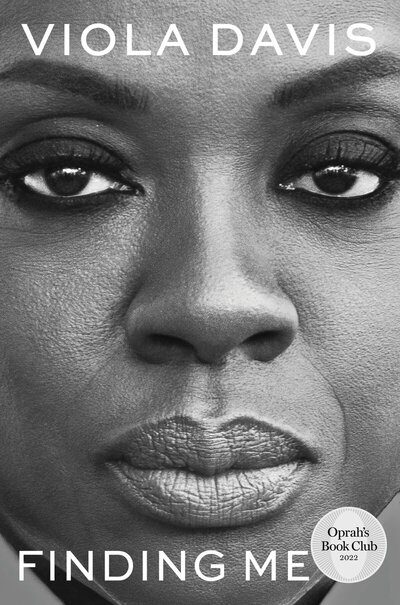
In Finding Me: A Memoir, American actress Viola Davis chronicles her roller-coaster journey from growing up in abject poverty to Hollywood fame. She describes her early childhood trauma, her parents challenges and the difficulties she had to navigate to become whole again. She writes:
Memories are immortal. They’re deathless and precise. They have the power of giving you joy and perspective in hard times. Or, they can strangle you. Define you in a way that’s based more in other people’s tucked-up perceptions than truth.
I had two parents who were running away from bad memories. Both had undiscovered dreams and hopes. Neither had tools to approach the world to find peace or joy. MaMama worked sporadically in factories and was a gambler. My father was an alcoholic and would disappear for months at a time when we were really young. He always came back, but by the time I was five I never remember him leaving for any long periods of time. Only later did I realize he was numbing, which is absolutely without question an understandable solution to dealing with a fucked-up world. Then, he would come back, from who knows where, and beat MaMama. Lashing out instead of lashing in.
When you haven’t had enough to eat, when your electricity and heat are cut off, you’re not afraid when someone says life is going to be hard. The fear factor was minimized for me. I already knew fear. My dreams were bigger than the fear.
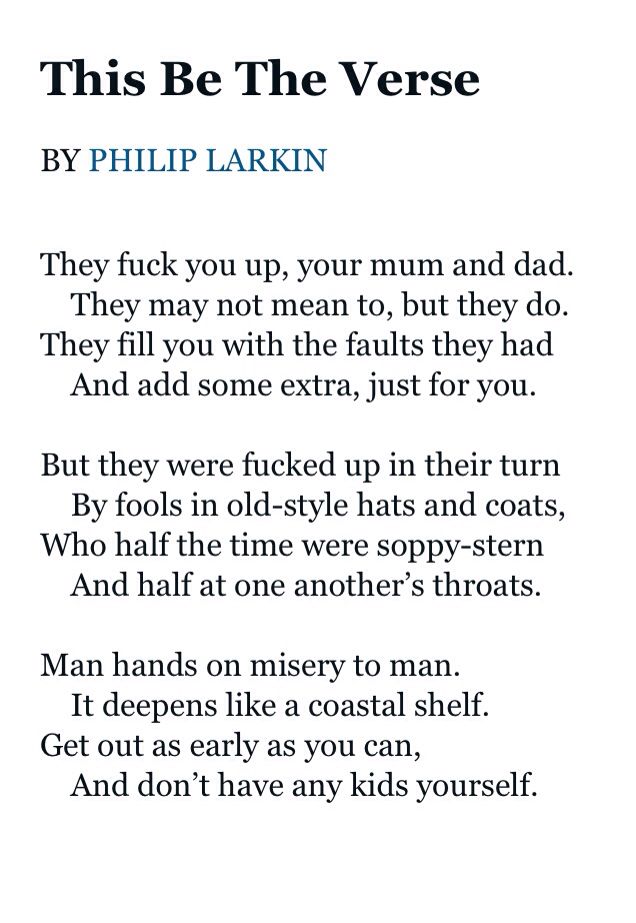
In his 1974 poem titled “This Be The Verse,” which was part of a collection of poems titled High Windows, English Poet Phillip Larkin observed:
They fuck you up, your mum and dad. They may not mean to, but they do. They fill you with the faults they had And add some extra, just for you. But they were fucked up in their turn By fools in old-style hats and coats, Who half the time were soppy-stern. And half at one another’s throats. Man hands on misery to man. It deepens like a coastal shelf. Get out as early as you can, And don’t have any kids yourself.
Man hands on misery to man. It deepens like a coastal shelf.
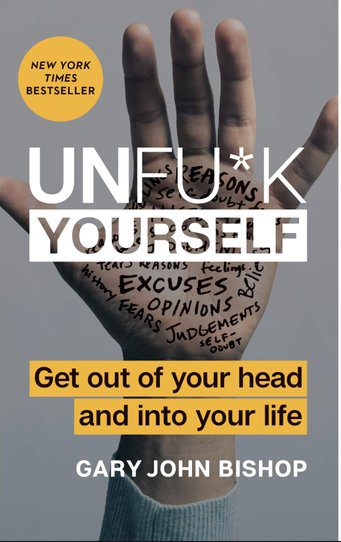
We are all victims of victims; our caregivers and parents tried their best with the resources they had at the moment. Knowing what you know now, being in denial about your fuckedupness would do you no good. You have to learn to unfuck yourself from your childhood trauma, stop the pretense, remove the mask and start living your life to the fullest. In Unfuck Yourself Get out of your head and into your life 3, author Gary John Bishop explains the concept of Getting out of your head with a series of seven assertions. Assertion four is embracing the uncertainty and implementing the strategies Bishop proposes could help you unfuck yourself. He writes;
The more we try to stay comfortable today, the more uncomfortable we’ll be tomorrow. There really is no destination, there is only exploring, exploring and exploring. Do the things you normally wouldn’t. Shake up that daily routine. Dare to dream, dare to risk and startle your life into life. Start with simple things. Take a different route to work. Instead of bringing your lunch or eating at the same few places, try somewhere you’ve never been. Start a conversation with the waiter or cashier. Smile and say hello to the people you pass on the street, or give them a friendly nod. Talk to that girl or guy who caught your eye.
Instead of simply stretching our comfort zones, let’s blow the thing up completely. Try acting in a way you’d never think about acting. Doing something completely out of character would be a great start. Embrace that uncertainty and strike a blow for your future!
As Gary John Bishop advised, one of the ways of unfucking yourself is to stretch your comfort zone, become comfortable with the uncomfortable by embracing the suck. I agree with Swiss psychiatrist and psychoanalyst Carl Jung, who said, “Until you make the unconscious conscious, it will direct your life, and you would call it fate.” The first key to unfucking yourself is first to admit that you were fucked up by your upbringing, become self-aware by becoming curious about your life, reparent yourself and become a better version of yourself daily through continuous growth.
All the best in your quest to get better. Don’t Settle: Live with Passion.
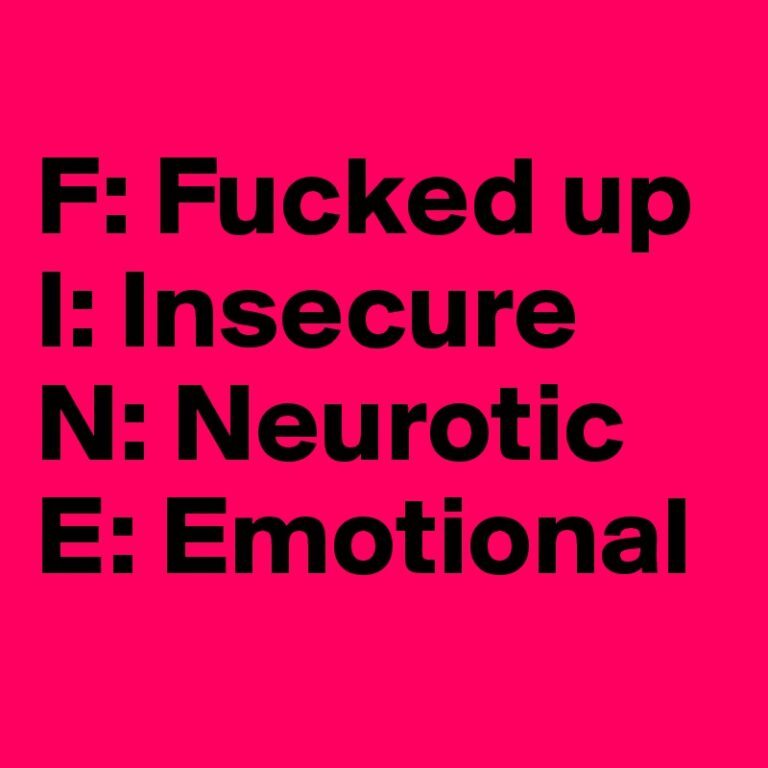
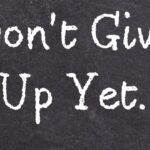

Comments are closed.